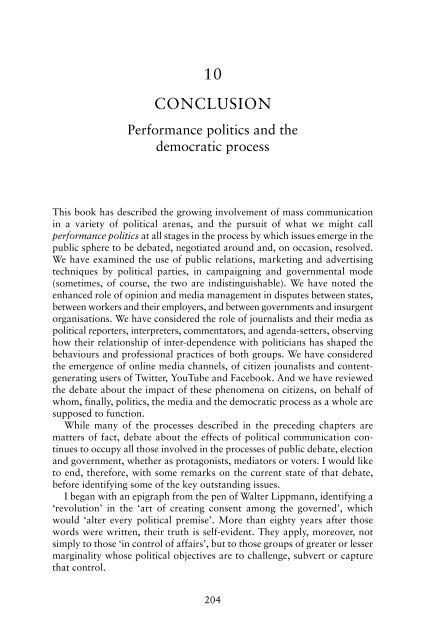20130412164339753295_book_an-introduction-to-political-communication
20130412164339753295_book_an-introduction-to-political-communication
20130412164339753295_book_an-introduction-to-political-communication
You also want an ePaper? Increase the reach of your titles
YUMPU automatically turns print PDFs into web optimized ePapers that Google loves.
10<br />
CONCLUSION<br />
Perform<strong>an</strong>ce politics <strong>an</strong>d the<br />
democratic process<br />
This <strong>book</strong> has described the growing involvement of mass <strong>communication</strong><br />
in a variety of <strong>political</strong> arenas, <strong>an</strong>d the pursuit of what we might call<br />
perform<strong>an</strong>ce politics at all stages in the process by which issues emerge in the<br />
public sphere <strong>to</strong> be debated, negotiated around <strong>an</strong>d, on occasion, resolved.<br />
We have examined the use of public relations, marketing <strong>an</strong>d advertising<br />
techniques by <strong>political</strong> parties, in campaigning <strong>an</strong>d governmental mode<br />
(sometimes, of course, the two are indistinguishable). We have noted the<br />
enh<strong>an</strong>ced role of opinion <strong>an</strong>d media m<strong>an</strong>agement in disputes between states,<br />
between workers <strong>an</strong>d their employers, <strong>an</strong>d between governments <strong>an</strong>d insurgent<br />
org<strong>an</strong>isations. We have considered the role of journalists <strong>an</strong>d their media as<br />
<strong>political</strong> reporters, interpreters, commenta<strong>to</strong>rs, <strong>an</strong>d agenda-setters, observing<br />
how their relationship of inter-dependence with politici<strong>an</strong>s has shaped the<br />
behaviours <strong>an</strong>d professional practices of both groups. We have considered<br />
the emergence of online media ch<strong>an</strong>nels, of citizen jounalists <strong>an</strong>d contentgenerating<br />
users of Twitter, YouTube <strong>an</strong>d Face<strong>book</strong>. And we have reviewed<br />
the debate about the impact of these phenomena on citizens, on behalf of<br />
whom, finally, politics, the media <strong>an</strong>d the democratic process as a whole are<br />
supposed <strong>to</strong> function.<br />
While m<strong>an</strong>y of the processes described in the preceding chapters are<br />
matters of fact, debate about the effects of <strong>political</strong> <strong>communication</strong> continues<br />
<strong>to</strong> occupy all those involved in the processes of public debate, election<br />
<strong>an</strong>d government, whether as protagonists, media<strong>to</strong>rs or voters. I would like<br />
<strong>to</strong> end, therefore, with some remarks on the current state of that debate,<br />
before identifying some of the key outst<strong>an</strong>ding issues.<br />
I beg<strong>an</strong> with <strong>an</strong> epigraph from the pen of Walter Lippm<strong>an</strong>n, identifying a<br />
‘revolution’ in the ‘art of creating consent among the governed’, which<br />
would ‘alter every <strong>political</strong> premise’. More th<strong>an</strong> eighty years after those<br />
words were written, their truth is self-evident. They apply, moreover, not<br />
simply <strong>to</strong> those ‘in control of affairs’, but <strong>to</strong> those groups of greater or lesser<br />
marginality whose <strong>political</strong> objectives are <strong>to</strong> challenge, subvert or capture<br />
that control.<br />
204
















